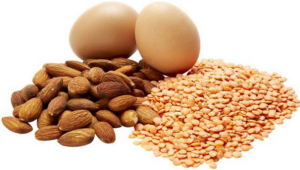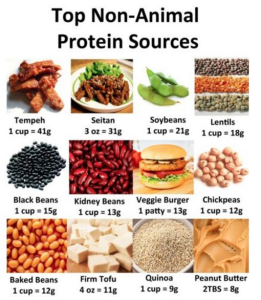Now we’re getting to the meat and potatoes. Well, maybe just the meat. The second macronutrient that I want to talk about is protein. It’s the one that never seems to get a bad rap. We hear all the time, incorrectly by the way, that carbohydrates are bad, or that fats are the devil incarnate, but for whatever reason protein seems to be impervious to criticism.
Well, I guess it’s pretty deserving. Protein, like the other macronutrients, is absolutely essential to a functioning body. Proteins serve so many functions in the body it would take me forever to list them all. They are critical bodily structure components, enzymes, and building blocks for other molecules, just to name a few. Also, like carbohydrate, protein carries 4 calories per gram.
The reason that we eat protein is to acquire what are called amino acids. Amino acids are the building blocks of proteins. If a protein was a long train, you could compare each train car to an amino acid. There are a total of 20 amino acids, 9 of which are considered essential, and 11 of which are considered nonessential.
What does essential mean?
An amino acid is considered essential if it cannot be made by the human body. Because it can’t be made, it has to be eaten in the diet. If not eaten in the diet, the body will experience a decline in health and function. An amino acid is considered nonessential if it can be made by the body. Because the body can make it, it does not have to be consumed in the diet.
So, now you might ask, where do I get these essential amino acids since I have to eat them? The answer is that all of the essential amino acids can be found in animal sources of protein. This includes meat, poultry, fish, eggs, and dairy products. Different foods have differing levels of various amino acids. If a food has all 9 of the essential amino acids, it is considered a complete protein. One example of a complete protein source is egg (Gropper & Smith, 186).

It’s important to note though, that plant sources of protein also contain some of the essential amino acids, but not all of them. So, this means that if you’re a vegetarian or vegan, you have to be very aware of the amino acid content of your food in order to ensure that you are consuming all of the essential amino acids. In other words, in the absence of animal proteins sources, you have to eat a wide variety of plant proteins to get all of the essential amino acids that you need. For example, if you’re a vegetarian and you eat a meal of brown rice you’re getting plenty of the amino acid methionine, but you’re lacking the amino acid lysine.To solve the problem, you could add beans to the meal, which contain the lacking amino acid. What you end up with is a complete protein meal because of complimentary proteins. That’s right, maybe you have to change your Chipotle burrito (Gropper & Smith, 239).

Going along with this idea of plant proteins, it’s important to note that there are other benefits to getting most of your protein from plant sources. To elaborate, plant sources of protein don’t carry with them things like cholesterol and saturated fat, which are only present in animal protein sources like steak and chicken. Also, plant protein sources like nuts and seeds have other beneficial health properties.
It is recommended that one consume 10%-35% of their calories per day from protein. This range is based on need for essential amino acids, and is commonly calculated as being .8 grams of protein for every kilogram of body weight. You might think that that might not sound like much, and you’d be right. In America, we over consume protein, sometimes to a ridiculous extent. Some people consume upwards of 400 grams of protein for day, which if sustained, can be detrimental to health. I’ll discuss the impacts of prolonged excessive protein intake in another post. While protein requirements can differ based on age, a disease state, or level of physical activity, it’s best for the average Joe to stick to the .8g/kg body weight rule (Gropper & Smith, 242).
Here’s a quick summary of basic protein knowledge:
Protein
- Essential macronutrient for functioning of body and maintaining body structure
- 4 calories per gram (same as Carbohydrate)
- Protein is consumed because the body needs amino acids
- 9 essential amino acids (must be consumed)
- 11 nonessential amino acids (body can synthesize)
- Complete proteins have all essential amino acids
- Focus on protein variety; particularly if vegetarian or vegan to consume all essential amino acids
- Suggested protein intake: .8 grams per kg body weight
Next time, we’ll talk about Fats
References
Gropper, S. A., Smith, J. L., & Groff, J. L. (2009). Advanced nutrition and human metabolism. Australia: Wadsworth/Cengage Learning.
